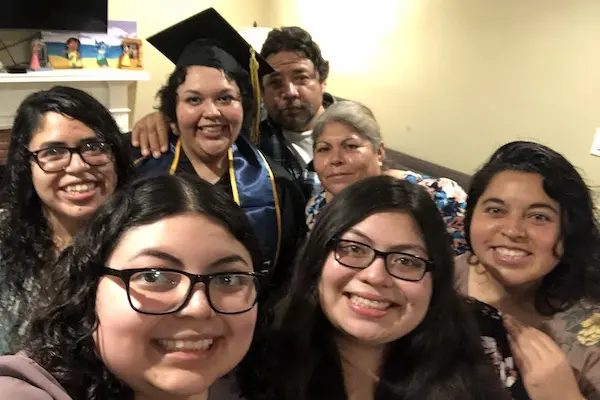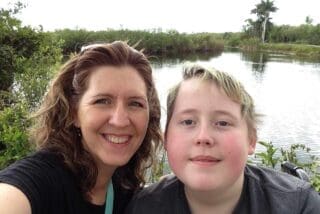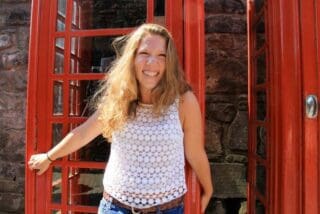
Mesothelioma.com is pleased to announce the winner of the 2022 scholarship, Guadalupe Barragan.
This fall, Guadalupe will continue to pursue her Master of Fine Arts (MFA) in English at California State University, Long Beach (CSULB). She has already earned three associate’s degrees and a bachelor’s degree. But, earning four degrees wasn’t the hardest part of her academic journey. Two illnesses would prove to be obstacles — but not obstacles that could stop her.
A Long and Winding Road
Guadalupe is the eldest of five sisters. With the support of her family, she first pursued an undergraduate degree in chemical engineering. Her school of choice was the University of California, Santa Barbara (UCSB). Yet, several factors led to her dropping out. First, she faced culture shock. Then, her schedule was overloaded with work, commuting and school. Finally, her grandmother fell ill and Guadalupe devoted herself to her care.
Ten years later, Guadalupe decided to pursue higher education again. She enrolled in her hometown’s community college, Oxnard College. There, Guadalupe excelled, exploring her passions for teaching and literature. In just one year, she graduated with associate’s degrees in English, Spanish and history.
After Oxnard, Guadalupe took on UCSB again.
“Returning to UCSB as an English major, I was nervous about my first experience over a decade earlier,” Guadalupe wrote in her application essay. “Nevertheless, I continued to succeed academically … Then, in the Spring of 2019, a mere eight weeks before my intended graduation, I discovered I had stage IV metastatic endometrial cancer and had to make the excruciatingly difficult decision to take time off again.”
A New World of Rhetoric
Guadalupe’s diagnosis exposed her not only to the world of cancer, but also to a very specific new language.
“At the time of my diagnosis, my doctor pronounced me a patient and a fighter in the same sentence,” she wrote. “I soon came to realize how the medical world adopts a cancer rhetoric that relies on limited metaphors in an attempt to both educate and empower patients during challenging circumstances.”
Guadalupe met other patients and learned more about their experiences. She mulled over the different facets of each patient she encountered and came up against a wall of unchanging metaphors.
“Health care professionals introduced me to a range of metaphors often used in relation to cancer,” she wrote. “The most common [metaphors] being those associated with war and violence, journeys, tests and animals. Because every patient experiences cancer differently, language that creates opposition between a patient and their cancer can produce feelings of failure and frustration.”
These experiences shifted Guadalupe’s vision for her future. She felt driven to pursue a doctoral degree and to try to bridge the gap between vague metaphors and what patients need to hear.
Cancer Changes the Person and Their Goals
Cancer diagnosis and treatment bring patients into unfamiliar spaces. For Guadalupe and others like her, this meant navigating insurance claims, medical billing offices, student aid departments and hospitals. She found all these experiences stuffed with jargon.
During a visit to her oncologist, Guadalupe realized exactly how little she knew about her own diagnosis. She asked whether tumor removal meant she was cured. Her doctor tried to explain the situation with medical speak and diagrams, but still, Guadalupe felt less than informed. Together, they discussed the situation until they hit upon a metaphor that resonated with Guadalupe.
This is just one example of the experiences that led Guadalupe to her new vision for cancer rhetoric.
“Language, especially figurative language, inhibits a patient’s experience. Through my own experience and that of other cancer patients I had the privilege to get to know, I learned cancer rhetoric must be founded on mutual language that considers the identity of each patient and how metaphors shape the definitions that become integral parts of their cancer narrative.”
Guadalupe Barragan
Guadalupe made it through multiple rounds and modes of treatment, including chemotherapy, radiation and several surgeries.
“My desire to return to school became the driving force required to overcome the surgical complications, subsequent mental health issues and withdrawals from discontinuing prescribed opioids.”
When she was ready, she enrolled at UCSB for her final semester. In September 2020, she completed a bachelor’s degree in English with a certification in medical humanities.
Next Steps
Now, Guadalupe is working towards an MFA degree at CSULB. She plans to continue her work and research on metaphors in cancer rhetoric. After she meets that degree milestone, she plans to pursue a dual Ph.D. in creative writing and literature.
She draws strength from her past experiences as a cancer patient and wants to help others come to terms with their own diagnoses and treatments.
“I have been a: first-generation student; transfer student; returning student; English as a second language and Equal Opportunity Program student; and commuting student,” she wrote. “I have even been a student living with cancer and undergoing chemotherapy treatments during a pandemic.”
Through it all, she has kept her drive and focus to achieve her goals.
“I have embraced the opportunity to learn about multi-ethnic literature and illness narratives,” she wrote. “[I’ve learned] how to better serve students from underrepresented communities and how to create a productive learning environment in my own classroom.”
Applications for the Mesothelioma.com Scholarship for 2023 will open soon. If you, or a loved one, have faced a cancer diagnosis, apply for a chance to win $4,000 toward your college education. The deadline for the 2023 scholarship is March 31, 2023.




